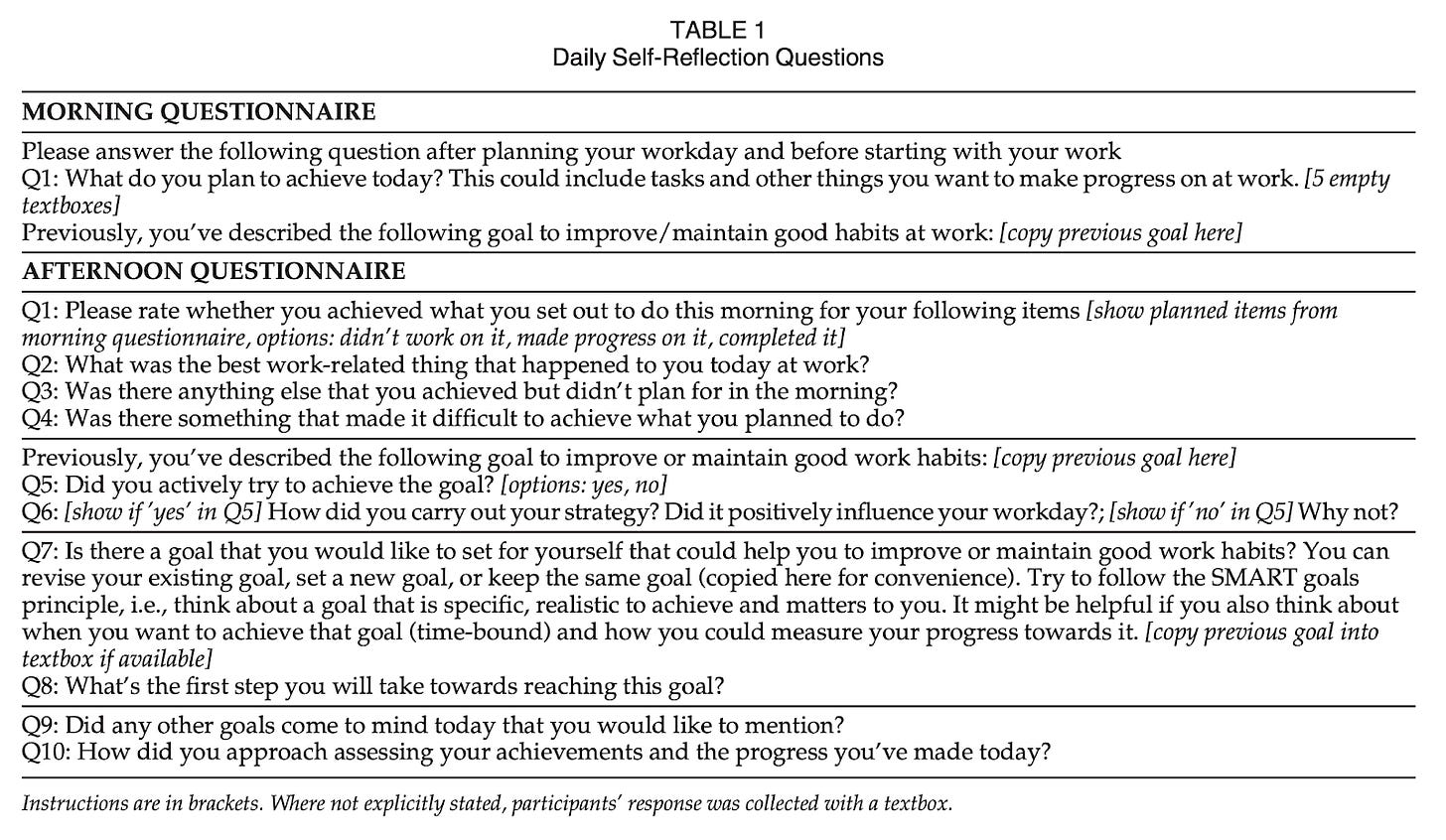Enabling Good Work Habits Through Reflective Goal-Setting
Reflective goal-setting can increase productivity at work.
This is the latest issue of my newsletter. Each week I cover the latest research and perspectives on developer productivity.
This week I read Enabling Good Work Habits in Software Developers through Reflective Goal-Setting by André N. Meyer, Gail C. Murphy, Thomas Zimmerman, and Thomas Fritz. This study explored developers’ goals and strategies for improving productive work habits.
This paper is insightful for managers because it gives insight into the practices that developers believe they can incorporate to improve their own productivity. It also found that when developers set goals for themselves to improve their own productivity, and then reflected on those goals daily for a few weeks, this led to an increase in productivity.
My summary of the paper
Previous research has found that developers are motivated to build better habits to improve their productivity. Prior studies have also explored developers’ existing work habits, however few studies have explored the strategies which developers can use to change their behavior in order and improve their productivity. This study sought to identify the goals developers could set for themselves, as well as whether this exercise of setting and reflecting on goals is worth the effort.
For this study, software developers from 10 different companies were prompted twice per day for two to three weeks to reflect on their work. There was a questionnaire developers would respond to before they started their day, and another at the end of their day. The questionnaires were developed based on previous research.
Here’s what the researchers found:
The types of work habit goals developers set for themselves
As part of the daily questionnaires, developers were asked to set a goal for themselves to improve or maintain good work habits. Researchers coded their responses and then grouped them into five categories of goals. These categories give us some insight into the practices developers believe would improve their own productivity, as well as what may be getting in the way of their personal productivity.
Improve time management. This category includes goals such as planning workdays in advance and making progress on the most important tasks. Developers achieve these goals by maintaining personal task lists and reviewing priorities before starting their day.
Avoid deviation from planned work. Another common goal amongst developers is to form habits that help them react better to interruptions, such as urgent issues, bugs, or other distractions such as email. These habits include blocking a specific amount of time for coding in their calendar and disabling notifications.
Improve impact on the team. Besides making progress on their tasks, developers also set goals to improve their impact on their teams. For example, developers aim to build habits such as sharing knowledge with team members or doing code reviews.
Maintain work-life balance. Developers also aim to build habits that would help them stay motivated and fresh at work, for example by taking short breaks, working more regular hours, and detaching from work in their spare time.
Learn continuously. Developers also set specific learning goals, such as learning a framework or language, or a development skill.
The researchers note that while developers had different goals to improve their work, there is an overarching objective across these categories: developers want to gain back control of their work to make more progress on their tasks. Prior studies support this observation and have shown that the single best motivator at work is to empower knowledge workers to make progress, which also increases their happiness.
The impact of reflective goal-setting
To learn more about the potential impact of reflective goal-setting on developers’ goals and strategies, the researchers compared participants’ responses describing their goal-setting practice prior to the study with their feedback after the study. They identified some benefits that this practice has for developers:
Self-reflection helps to identify concrete goals for improving personal productivity. 84% of the participants reported that reflecting on the progress they had made that day, as well as the positive or negative aspects about their day, raised their awareness about their existing work habits and progress at work. Some developers found it easier to identify concrete ways they could improve their habits after they had reflected on their work in this way for a few days.
Reflective goal-setting can increase perceived productivity. 80% of the participants agreed that the regular self-reflections and goal-setting led to positive behavior change towards the goals they had set. Additionally, 92% of participants said they planned to keep their new behavior because they were satisfied with their increased progress and productivity.
Final thoughts
There are multiple levels at which productivity can be improved; this paper provides a strategy for improving productivity at the individual level. Leaders can support individual productivity by asking developers to set goals for improving their work habits, and encouraging them to regularly reflect on their progress towards those goals. This practice leads to productive behavior changes that increase productivity. Additionally, in this study, this reflective goal-setting practice appears to become easier over time.
I also found it interesting that the overarching goal amongst developers was to gain back control over how they use their time. This may serve as a reminder to check in with teams about how productive they feel and how much time they have for deep work, and then encourage them to have more agency over their workday.
That’s it for this week! If you’re finding this newsletter valuable, share it with a friend, and consider subscribing if you haven’t already:
-Abi




